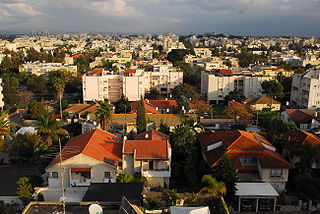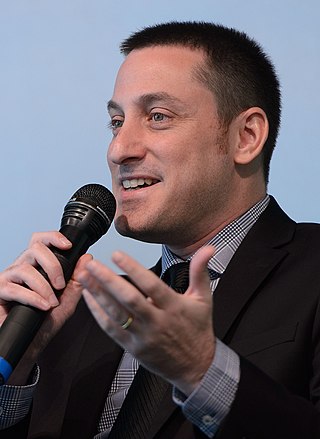
Ra'anana is an affluent city in the southern Sharon Plain of the Central District of Israel. It was founded in 1922 as an American-Jewish settlement, c.1 km south of the village of Tabsur, where an important World War I battle had taken place four years previously.

The 933rd "Nahal" Brigade is one of the Israel Defense Forces' main infantry brigades. It has operated in all major wars and large-scale operations since its inception in 1982, playing key roles during the 1982 and the 2006 Lebanon Wars and the First and Second Intifadas.

General Staff Reconnaissance Unit, more commonly known as Sayeret Matkal, is the special reconnaissance unit (sayeret) of Israel's General Staff (matkal). It is considered one of the premier special forces units of Israel.

Benjamin "Fuad" Ben-Eliezer was an Iraqi-born Israeli politician and general. He served as a member of the Knesset between 1984 and 2014, and held several ministerial posts, including Minister of Industry, Trade and Labour; Minister of Defense; and Deputy Prime Minister. He served as leader of the Israeli Labor Party between 2001 and 2002.

The Battle of Bint Jbeil was one of the main battles of the 2006 Lebanon War. Bint Jbeil is a major town of some 20,000 inhabitants in Southern Lebanon. Although Brig.-Gen. Gal Hirsch announced on 25 July that the Israel Defense Forces (IDF) had "complete control" of Bint Jbeil, this statement was later discredited. In spite of three sustained attempts by the IDF to conquer the town, it remained in the hands of Hezbollah until the end of the war. The town was the scene of some of the fiercest fighting of the war, with both sides taking heavy losses. Three senior Israeli officers, including Major Roi Klein, were killed in the battle. Hezbollah similarly lost several commanders, most notably Khalid Bazzi, commander of the Bint Jbeil area.
The Battle of Maroun al-Ras was a battle of the 2006 Lebanon War that took place in Maroun ar-Ras, a small village in southern Lebanon on the border with Israel, and Jall ad-Dayr, a nearby Hezbollah stronghold. This battle was the first serious ground battle in the 2006 Lebanon war. It was fought to a large extent by elite forces on both sides and would have huge consequences for the future of the war. Although, Israeli forces captured most of the town, they did not fully secure it.

The 2006 Hezbollah cross-border raid was a cross-border attack carried out by Lebanon-based Hezbollah militants on an Israeli military patrol on 12 July 2006 on Israeli territory.
Roi Klein (Hebrew: רועי קליין; IPA:[ʁoˈʕiklain]; was an Israeli major in the Golani Brigade of the Israeli Defense Forces who died during the 2006 Lebanon War. Klein was killed in the Battle of Bint Jbeil after jumping on a grenade to save his fellow soldiers.

Unit 5101, more commonly known as Shaldag, is one of the premier Israeli Air Force (IAF) Sayeret units. The unit is part of the 7th Special Air Forces Wing and is based in the Palmachim Airbase. The unit is led by an officer at the rank of lieutenant colonel.
Garin Tzabar is a program that facilitates service in the Israel Defense Forces (IDF) and provides a support system for Israelis and Diaspora Jews who do not have parents in Israel. Soldiers who do not have at least one parent living in Israel are called "Lone Soldiers". The Garin Tzabar members are Jewish young adults and sons and daughters of Israelis living abroad, who wish to make Israel their home and serve a meaningful service in the IDF as Lone Soldiers. Upon their Aliyah, the group is adopted by an Israel community and live there for three months during which they study Hebrew and navigate the necessary bureaucratic and military processes that are required before their imminent draft. Upon enlistment, participants are required to remain on their respective Kibbutz for at least a year. In addition to Garin Tzabar staff, soldiers and educators from the IDF and teachers from the Ministry of Education assist with the transition.

Avichai Rontzki was an Israeli Chief Military Rabbi of the Israel Defense Forces. He served in the position from 2006 to 2010, with a rank of Brigadier General. His predecessor in that position was Rabbi Israel Weiss. Rontzki was also the rosh yeshiva of the Hesder Yeshiva in Itamar.

Uri Sagi is an Israeli retired general who held several prominent posts including commander of the Golani Brigade and chief of the IDF's Military Intelligence Directorate.

A lone soldier is a member of the Israel Defense Forces (IDF) who does not have support in Israel, either because they do not have immediate family in Israel or they are estranged from their family in Israel. Lone soldiers serve in regular IDF units, including combat units, and receive special entitlements from the IDF, Israeli government ministries, and charity organizations, such as increased salaries, housing assistance, and additional leave. As of June 2022, there were approximately 7,000 lone soldiers from over 60 countries.

Naftali Bennett is an Israeli politician who served as the 13th prime minister of Israel from 13 June 2021 to 30 June 2022, and as the 3rd Alternate Prime Minister of Israel from 1 July to 8 November 2022. Bennett was the leader of the New Right party from 2018 to 2022, having previously led The Jewish Home party between 2012 and 2018.

Shelly Rachel Yachimovich is an Israeli politician, who served three terms as the official Leader of the Opposition, a member of the Knesset, and a member of the Foreign Affairs and Defense Committee. She served as leader of the Israeli Labor Party between 2011 and 2013. Before entering politics, she was a journalist, an author, and a television and radio commentator.
On 30 June 2016, a 17-year-old Palestinian male broke into a home in the Israeli settlement of Kiryat Arba and stabbed to death Hallel Yaffa Ariel a thirteen year old Israeli-American citizen in her bedroom. The attacker was then fatally shot by security guards. Israeli Prime Minister Benjamin Netanyahu blamed "incitement-driven terrorists" while the U.S. State Department condemned the "outrageous terrorist attack".
Israeli Special Forces Operations in 2006 were part of the Second Lebanon War. Several commando units of the Israel Defence Forces launched dozens of operations against Hizbullah targets in Lebanon. Most of these were never publicized and many may have consisted of intelligence-gathering probes into Lebanese territory.

Moshe "Chiko" Tamir is an Israeli brigadier general who commanded the Gaza Division of the Israel Defense Forces.

Barak Ravid is an Israeli journalist and a CNN political and foreign policy analyst. He previously worked for Israel's Channel 13 News. He is also active in the English-language media, writing for Axios about Israeli politics.

Barak Hiram is an IDF officer with the rank of Brigadier general, currently serving as the commander of the 99th Infantry Division. Previously, he served as the commander of the Golani Brigade, the commander of the live-fire training center in the IDF, the commander of the Golani Brigade, the commander of Golani's training base, and the commander of Battalion 51.














